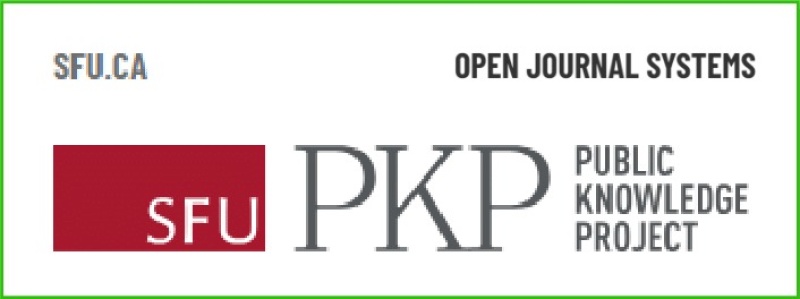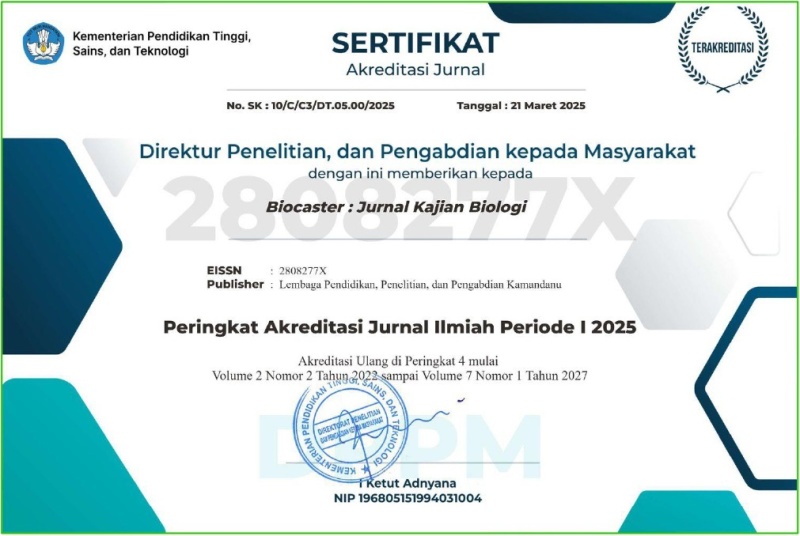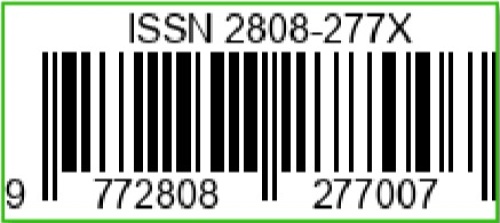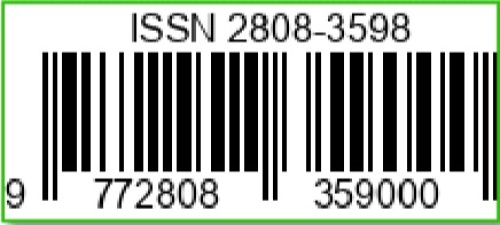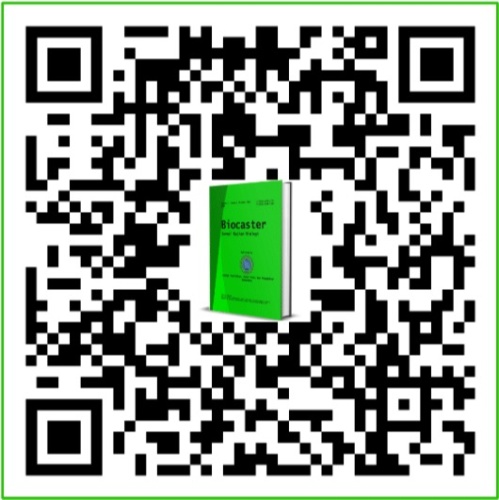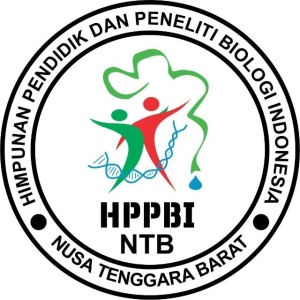Ethnobotanical, Phytochemical, and Pharmacologies Aspect of Kaempferia rotunda L. as a Local Herbal Plant with Global Potential: A Review
DOI:
https://doi.org/10.36312/biocaster.v5i3.462Keywords:
Ethnobotany, Herbal Medicine, Kaempferia rotunda L., Pharmacology, PhytochemistryAbstract
Kaempferia rotunda L., also known as kunci pepet, is a local herbal plant with global potential traditionally used in various medicinal practices across Southeast Asia. This review summarizes the ethnobotanical, phytochemical, and pharmacological aspects of Kaempferia rotunda L., to explore its applications in modern medicine. Ethnobotanically, its rhizome has been widely utilized for treating digestive disorders, inflammation, and wound healing. Phytochemical studies reveal that Kaempferia rotunda L., contains flavonoids, alkaloids, phenols, and terpenoids, contributing to its biological activities. Several studies have demonstrated significant anti-inflammatory, antibacterial, antioxidant, and anticancer properties. With the increasing demand for natural-based therapies, further exploration of their active compounds and mechanisms of action is highly relevant. This review aims to provide a broader insight into the pharmaceutical potential of Kaempferia rotunda L., and encourage further research for the development of evidence-based herbal medicine.
Downloads
References
Aryantini, D., Astuti, P., Yuniarti, N., & Wahyuono, S. (2023). Bioassay-Guided Isolation of the Antioxidant Constituent from Kaempferia rotunda L. Biodiversitas, 24(6), 3641-3647. https://doi.org/10.13057/biodiv/d240665
Atun, S., & Arianingrum, R. (2017). Characterization of Nanoparticles Produced by Chloroform Fraction of Kaempferia rotunda Rhizome Loaded with Alginic Acid and Chitosan and its Biological Activity Test. Asian Journal of Pharmaceutical and Clinical Research, 10(5), 399-403. https://doi.org/10.22159/ajpcr.2017.v10i5.16936
Atun, S., Arianingrum, R., Sulistyowati, E., & Aznam, N. (2013). Isolation and Antimutagenic Activity of Some Flavanone Compounds from Kaempferia rotunda. International Journal of Chemical and Analytical Science, 4(1), 3-8. https://doi.org/10.1016/j.ijcas.2013.03.004
Chhetri, D., Jyothi, Y., Lalhriatpuii, L., Sohaila, S., & Rachana, G. (2024). Antigenotoxicity of Tuberous Rhizomes of Kaempferia rotunda Linn. in Cyclophosphamide Induced Genotoxicity: In Vitro and In Vivo Study. Indian Journal of Science and Technology, 16(47), 4577-4584. https://doi.org/10.17485/IJST/v16i47.2971
Diastuti, H., Chasani, M., & Suwandri, S. (2020). Antibacterial Activity of Benzyl Benzoate and Crotepoxide from Kaempferia rotunda L. Rhizome. Indonesian Journal of Chemistry, 20(1), 9-15. https://doi.org/10.22146/ijc.37526
Dwira, S., Ariska, T. P., Fadilah, F., Azizah, N. N., & Erlina, L. (2020). Comparison of Cytotoxicity Between Ethyl Acetate and Ethanol Extract of White Turmeric (Kaempferia rotunda) Rhizome Extract Against Hela Cervical Cancer Cell Activity. Pharmacognosy Journal, 12(6), 1297-1302. https://doi.org/10.5530/PJ.2020.12.178
Elshamy, A. I., Mohamed, T. A., Essa, A. F., Abd-Elgawad, A. M., Alqahtani, A. S., Shahat, A. A., Yoneyama, T., Farrag, A. R. H., Noji, M., El-Seedi, H. R., Umeyama, A., Paré, P. W., & Hegazy, M. E. F. (2019). Recent Advances in Kaempferia Phytochemistry and Biological Activity: A Comprehensive Review. Nutrients, 11(10), 1-33. https://doi.org/10.3390/nu11102396
Fauziah, D. T., Herowati, R., & Widodo, G. P. (2020). Uji Aktivitas Antimikroba Ekstrak Kunci Pepet (Kaempferia rotunda L.). Jurnal Kesehatan Dr. Soebandi, 8(2), 154-157. https://doi.org/10.36858/jkds.v8i2.240
Hashiguchi, A., Thawtar, M. S., Duangsodsri, T., Kusano, M., & Watanabe, K. N. (2022). Biofunctional Properties and Plant Physiology of Kaempferia spp.: Status and Trends. Journal of Functional Foods, 92(1), 1-13. https://doi.org/10.1016/j.jff.2022.105029
Imam, A. S., Rout, K. S., Sutar, N., Sharma, S. U., & Sutar, R. (2013). Wound Healing Activity of Kaempferia rotunda Linn Leaf Extract. International Journal of Current Microbiology and Applied Sciences, 2(12), 74-78.
Kabir, S. R., Hossen, A., Zubair, A., Alom, J., Islam, F., Hossain, A., & Kimura, Y. (2011). A New Lectin from the Tuberous Rhizome of Kaempferia rotunda: Isolation, Characterization, Antibacterial and Antiproliferative Activities. Protein & Peptide Letters, 18(11), 1140-1149. https://doi.org/10.2174/092986611797200896
Krishna, A. G., Ansary, P. Y., & Oommen, S. M. (2020). Kaempferia rotunda Linn.-Phytochemical Profile. International Research Journal of Pharmacy and Medical Sciences (IRJPMS), 3(6), 21-24. https://doi.org/10.13140/RG.2.2.13991.37283
Krishnakumar, P., Varghese, M., Joe, M. G., Rajagopal, A., & Varghese, L. (2021). Identification and Bioactivities of Endophytic Fungi from Lagenandra toxicaria Dalz. and Kaempferia rotunda L. Journal of Applied Biology and Biotechnology, 9(4), 117-125. https://doi.org/10.7324/JABB.2021.9416
Kumar, A., Kumar, S., & Navneet, N. (2015). Antimicrobial Activity and Phytochemical Analysis of Kaempferia rotunda L. Rhizomes. Der Pharmacia Lettre, 7(9), 389-395.
Lallo, S., Lee, S., Dibwe, D. F., Tezuka, Y., & Morita, H. (2014). A New Polyoxygenated Cyclohexane and Other Constituents from Kaempferia rotunda and Their Cytotoxic Activity. Natural Product Research, 28(20), 1754-1759. https://doi.org/10.1080/14786419.2014.945175
Mustafaanand, P. H. (2014). In-Vitro Plant Regeneration in Kaempferia rotunda Linn. through Somatic Embryogenesis - A Rare Medicinal Plant. International Journal of Current Microbiology and Applied Sciences, 3(9), 409-414.
Pham, N. K., Nguyen, H. T., & Nguyen, Q. B. (2020). A Review on the Ethnomedicinal Uses, Phytochemistry and Pharmacology of Plant Species Belonging to Kaempferia L. Genus (Zingiberaceae). Pharmaceutical Sciences Asia, 48(1), 1-24. https://doi.org/10.29090/PSA.2021.01.19.070
Ragsasilp, A., Saensouk, P., Pholhiamhan, R., & Saensouk, S. (2018). Ethnobotany of Phu Thai Ethnic Group in Nakhon Phanom Province, Thailand. Walailak Journal of Science and Technology, 15(10), 679-699. https://doi.org/10.48048/wjst.2018.3737
Raslina, H., Dharmawibawa, I. D., & Safnowandi, S. (2018). Diversity of Medicinal Plants in National Park of Rinjani Mountain in Order to Arrange Practical Handout of Phanerogamae Systematics. Bioscientist : Jurnal Ilmiah Biologi, 4(1), 1-6. https://doi.org/10.33394/bioscientist.v4i1.210
Saputera, S., Ludang, Y., Jaya, H. P., & Atikah, T. A. (2023). Analysis of Bioactive Content of White Turmeric Rhizome (Kaempferia rotunda) Growing in Central Kalimantan. International Journal of Biology and Biomedical Engineering, 17(1), 8-15. https://doi.org/10.46300/91011.2023.17.2
Seno, D. S. H., Larasati, C., Kamila, F., Marwanto, Y. D., Liwanda, N., & Nurcholis, W. (2023). Effects of Solvent Combinations of Phenolics and Antioxidants Extraction from Kaempferia rotunda Rhizomes. International Journal of Chemical and Biochemical Sciences, 23(3), 206-210.
Singh, A., Singh, N., Singh, S., Srivastava, R. P., Singh, L., Verma, P. C., Devkota, H. P., Rahman, L. U., Rajak, B. K., Singh, A., & Saxena, G. (2023). The Industrially Important Genus Kaempferia: An Ethnopharmacological Review. Frontiers in Pharmacology, 14(1), 1-18. https://doi.org/10.3389/fphar.2023.1099523
Sultana, Z., Mohammad, F., Azam, S., Rahman, S., Rahman, S., Islam, F., & Rahmatullah, M. (2012). Evaluation of Antihyperglycemic and Antinociceptive Activities of Methanolic Extract of Kaempferia rotunda L. (Zingiberaceae) Rhizomes. Advances in Natural and Applied Sciences, 6(8), 1302-1306.
Suphrom, N., Sonyot, W., Insumrong, K., Sawangsup, P., Sutamuang, P., & Ingkaninan, K. (2017). GC-MS Analysis and In Vitro Anti-Androgenic Activity of Kaempferia rotunda Linn Extract. Asian Health, Science and Technology Reports, 25(4), 34-43.
Utami, N. W. (2019). Pertumbuhan Kaempferia rotunda L. dengan Perlakuan Variasi Jumlah Umbi Semu dan Penambahan Pupuk Organik. Biota : Jurnal Ilmiah Ilmu-ilmu Hayati, 10(1), 36-42. https://doi.org/10.24002/biota.v10i1.2797
Yadav, S., Sharma, A., & Sharma, M. C. (2023). Investigation of the Wound Healing Potential of Kaempferia rotunda (Ginger) Extract. Advances in Bioresearch, 14(4), 149-153. https://doi.org/10.15515/abr.0976-4585.14.4.149153
Downloads
Published
How to Cite
Issue
Section
License
Copyright (c) 2025 Aloysia Sri Pujiyanti, Ratna Kusuma, Annisa Nurul Ilmi, & Febry Rahmadhani Hasibuan

This work is licensed under a Creative Commons Attribution-ShareAlike 4.0 International License.
-
Attribution — You must give appropriate credit, provide a link to the license, and indicate if changes were made. You may do so in any reasonable manner, but not in any way that suggests the licensor endorses you or your use.
-
ShareAlike — If you remix, transform, or build upon the material, you must distribute your contributions under the same license as the original.


